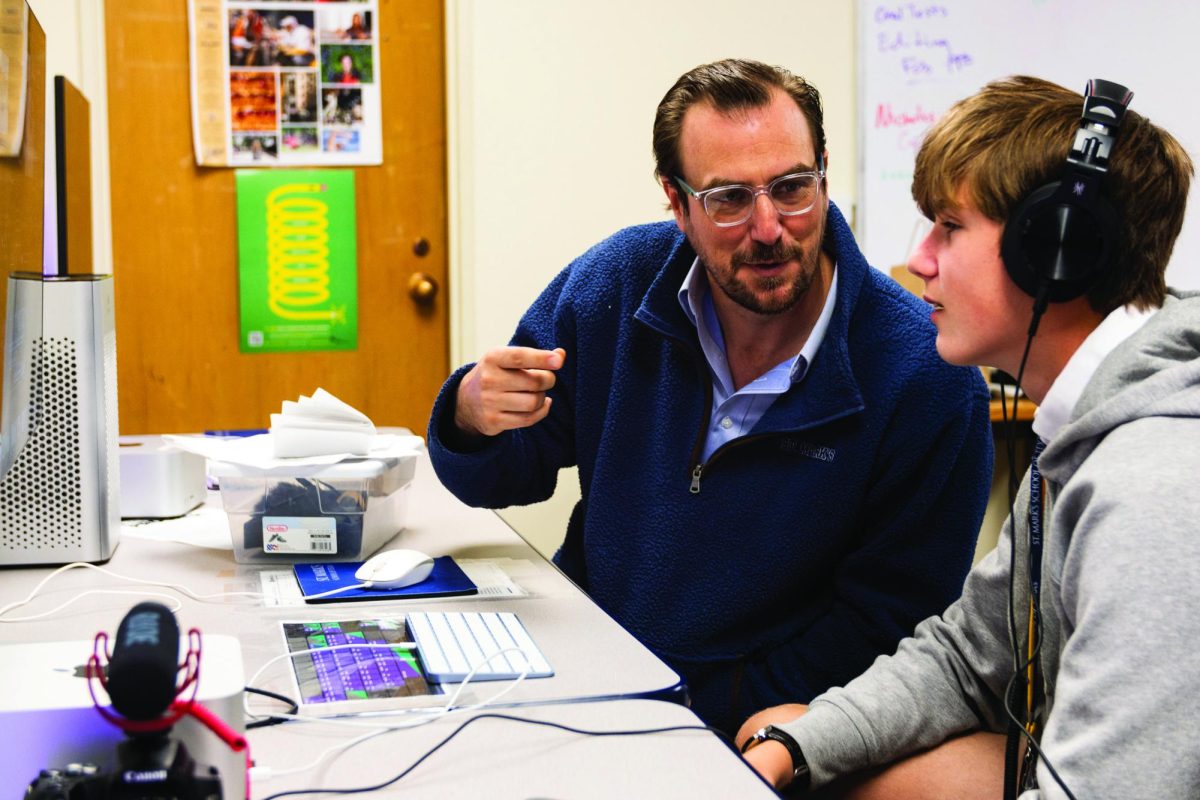
Photo by Winston Lin
Film Studies Teacher Mark Scheibmeir helps eighth grader Pierce Tevis edit his film.
The freedom to choose your own classes is one unique privilege given to students.
With core subjects like mathematics and language required, there are few decisions students have to make every spring. So these seemingly insignificant decisions—choosing fine arts, English classes, electives—are chances for students to pursue interests and find new ones.
It excites students to take a class that they want to take, rather than required to take.
But behind the various classes are the teachers that proposed them. Teachers who have to design the curriculum. Teach an extra class.
From a student’s perspective, it seems like extra work and headaches.
But course requests are an opportunity for teachers to teach a unique class that they have a specialized passion for.
Philosophy. Dystopian Literature. Special Operations.
To these passionate teachers, it’s about offering a chance to learn something outside of one’s comfort zone.
It’s about making a difference.
In late winter, film studies instructor Mark Scheibmeir proposed a class for all high school students: ‘Documentary Film.’ Scheibmeir and all the other faculty members who put forward potential classes don’t get any material benefit — they have the sole motive of helping our school grow as a collective.
“A lot of teachers probably don’t get into teaching for financial reasons,” Scheibmeir said. “We do it for the students and to see how we can make a difference. When we see students that might benefit from a course, we want to fulfill that for them.”
Specifically, English 12, a mandatory class for seniors, has traditionally had the most diverse classes, ranging from ‘Dystopian Literature’ to ‘Literature of Human Rights.’ These classes offer opportunities for students to engage in discussions that they truly are interested in, and this year, the English department has added three new courses: ‘Creative Writing: Poetry’; ‘Creative Writing: Short Fiction & Creative Nonfiction’; and ‘The Bible as Literature.’
“We have a slew of options for the kids to choose for the English 12 courses, so they don’t all (get enough signups),” Director of Academic Information Systems Paul Mlakar said. “And that’s where staffing can be in flux, or if some are more popular than others, we want to have student-driven decision making when it comes to the requests.”
Of course, it’s always possible that some classes just don’t have enough student interest, and they may be dropped.
On the other hand, some classes can actually be expanded as student interest increases.
“We’ll try to honor all those requests,” Mlakar said. “And so sometimes that means that if one teacher offers a class, but we need two sections of it, we might need another teacher to step in and teach a second section. That’s happened with some of those English 12 classes, too.”
The addition of new courses also provides the opportunity for departments to expand their curriculum.
In the case of the math department, a new Multivariate Calculus course is being added to the system, allowing advanced students to choose between the math-intensive Advanced Topics class or the more general Multivariate Calculus course.
“It was more of a discussion with the members of the math department, recognizing that we’ve got a great course in advanced topics with Dr. Feng,” Mlakar said. “But if (students) are going into a different STEM area than just math, we recognize that Multivariate Calculus is the next calculus that a lot of kids will take if you’re going into engineering or other sciences.”
Ultimately, teachers prioritize the experience of the students first, creating classes that they believe that students would be interested in.
The new courses act as both an opportunity for the teacher and for the student to explore new fields of study.
Victor F. White Master Teaching Chair in English GayMarie Vaughan has taught a variety of English 12 courses, such as ‘Science Fiction’ and ‘The Literature of War and Survival.’
To her, just being in a class with people who share the same interests — who want to be there — is more than enough.
“It’s work, but it’s fun work,” Vaughan said. “If you’re gonna spend time doing something, you might as well be doing something you enjoy.”